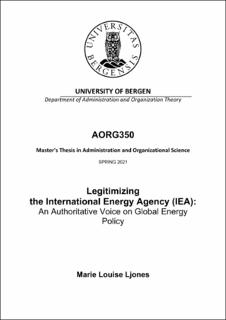Legitimizing the International Energy Agency (IEA): An Authoritative Voice on Global Energy Policy
Master thesis

View/
Date
2021-07-01Metadata
Show full item recordCollections
- Master theses [82]
Abstract
When an international organization gains authority and becomes more prominent in the public sphere, contestation rise and the need to legitimize its exercise of authority grows. Although legitimation processes of international organizations is a topic of growing interest, very few scholars have done a detailed study on the legitimation process employed by an epistemic IO authority in the global governance system. The aim of this study is to investigate how an epistemic IO authority such as the International Energy Agency (IEA) legitimize its authority in the global governance system despite inherent legitimation issues. To answer the specific research questions, I have performed two separate analysis. First, a qualitative in-depth analysis of the IEA to reveal how institutional qualities of the IEA can shape legitimacy beliefs towards the organization. Next, a combined quantitative/qualitative media content analysis to learn more about the role of media in IEA’s legitimation process during the last ten years. Data was obtained from one center-left and one center-right quality newspaper in three IEA member countries. The results showed that the IEA has been actively engaged in legitimation processes at many levels, using various institutional sources of legitimation that are linked to the technocratic narrative. The results also revealed that there has been very little criticism of the IEA in the media during the selected ten-year period. These results suggest that the IEA might have succeeded in becoming a trusted IO authority and therefore managed to curb contestation. Another plausible explanation might be that the world has become so complex these past decades that we recognize the limits of rationality and therefore also realize the need for epistemic expert organizations such as the IEA.